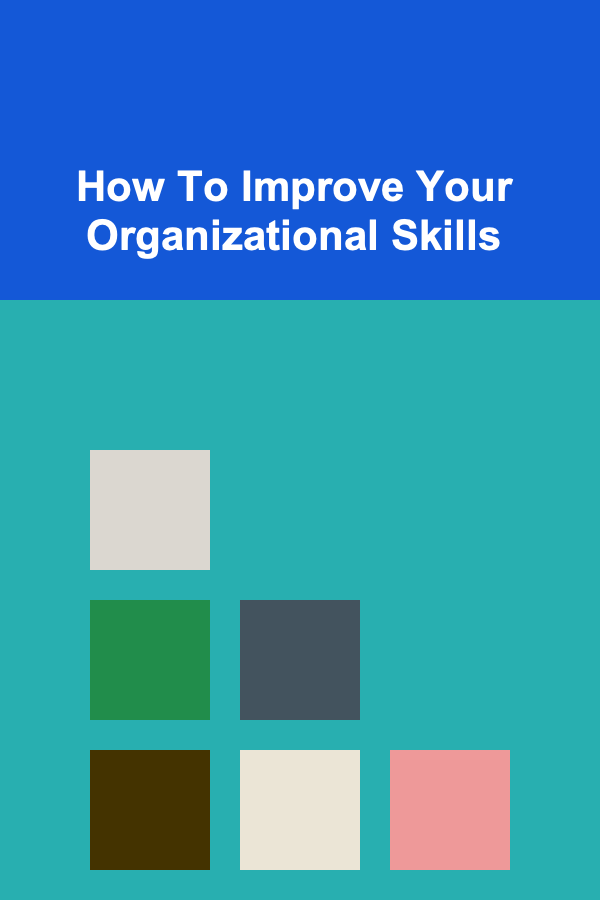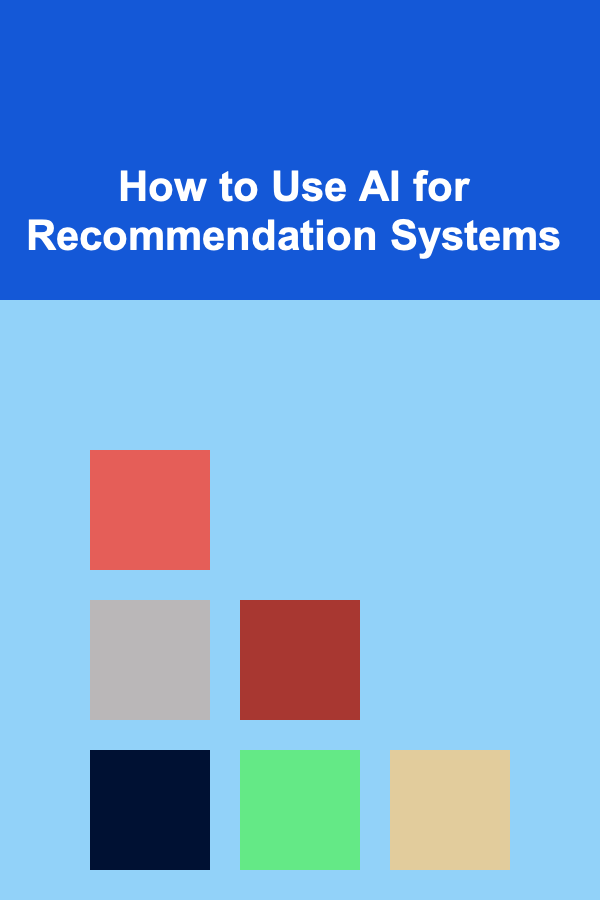
How To Improve Your Organizational Skills
ebook include PDF & Audio bundle (Micro Guide)
$12.99$7.99
Limited Time Offer! Order within the next:

Organizational skills are the backbone of productivity. Whether you're managing a project at work, keeping track of personal tasks, or juggling multiple responsibilities, being organized can have a profound effect on your efficiency, mental clarity, and overall quality of life. In this article, we will explore actionable strategies and insights to help you enhance your organizational skills, improve your workflow, and become a more effective individual both personally and professionally.
Understand the Importance of Organizational Skills
Before diving into how to improve your organizational skills, it's crucial to understand why they matter. Organizational skills are essential in almost every aspect of life. Here's why:
- Improved Efficiency: When you're organized, you can complete tasks faster and more efficiently because you have a clear sense of what needs to be done and the tools necessary to get it done.
- Stress Reduction: Disorganization often leads to stress, as you're constantly scrambling to find things or remember important deadlines. Organizing your life reduces unnecessary stress and promotes mental well-being.
- Better Time Management: Organizational skills are inherently tied to good time management. Being able to prioritize tasks and allocate time efficiently leads to better overall time usage.
- Clearer Communication: When you're organized, it's easier to share information with others, whether it's a project at work or a personal commitment. Clear organization often translates into clearer communication.
Assess Your Current Organizational Habits
Before improving your organizational skills, it's important to assess your current habits. Take a step back and observe how you manage your time, tasks, and commitments. Here are a few questions to ask yourself:
- Do I often forget deadlines or important events?
- Do I feel overwhelmed by the number of tasks I have to complete?
- Am I regularly late to meetings or appointments?
- Do I have a system in place for managing my daily tasks, or do I rely on memory?
By identifying areas of weakness, you can more easily pinpoint where improvements are necessary. A self-assessment allows you to track your progress over time, as well as adjust strategies to fit your personal needs.
Develop a System for Task Management
A good organizational system starts with a reliable method for managing tasks. Depending on your personal preferences, this system can be either physical or digital, or a combination of both. Here are a few approaches to consider:
3.1. To-Do Lists
To-do lists are one of the simplest and most effective ways to keep track of tasks. There's something satisfying about crossing off completed items, and having a list helps you visually track what needs to be done. But to-do lists are only effective if they're properly structured.
To make your to-do lists more efficient:
- Be specific: Instead of vague tasks like "work on project," break them down into more actionable steps like "write report introduction" or "find research sources for project."
- Prioritize: Not all tasks are created equal. Use a prioritization system (such as the Eisenhower Matrix or ABC prioritization) to rank tasks based on urgency and importance.
- Review daily: Check your list every morning and evening. Adjust tasks as needed and add new ones to stay on top of all your responsibilities.
3.2. Digital Task Management Tools
If you prefer a more automated approach, digital task management tools like Trello , Todoist , Asana , or Notion can help you stay organized. These tools allow you to organize tasks, set deadlines, track progress, and even collaborate with others. They offer various features that allow you to customize your workflow and manage tasks in a way that suits your preferences.
3.3. Time Blocking
Time blocking is a productivity technique where you allocate specific chunks of time to different tasks. By scheduling time for specific activities, you avoid multitasking and create a more structured day. It helps to prevent time-wasting and ensures that you're focused on one task at a time.
Here's how you can implement time blocking:
- Set clear goals: Know exactly what you need to accomplish during each time block.
- Schedule breaks: Don't forget to include breaks to recharge and refresh.
- Avoid distractions: During your time block, minimize interruptions by turning off notifications or setting your phone on silent.
Keep Your Space Organized
Organizational skills aren't limited to task management; physical organization is equally important. A cluttered workspace can lead to distractions and mental clutter. A clean, organized environment encourages productivity and helps you stay focused.
4.1. Declutter Regularly
The more cluttered your environment, the harder it is to focus on important tasks. Set aside time to declutter your space on a regular basis, whether that means tidying up your desk or organizing your home. A clean space gives you mental clarity and sets the tone for a productive day.
4.2. Implement Storage Solutions
The key to maintaining an organized workspace is to implement effective storage solutions. Invest in filing cabinets, drawer organizers, or shelf dividers to keep everything in its place. Group related items together and label storage containers to make it easier to find what you need.
4.3. Maintain Digital Organization
Your digital workspace can get just as cluttered as your physical one. Files, emails, and documents can quickly pile up if left unmanaged. Create folders, use cloud storage, and regularly clean out your inbox to avoid digital chaos.
Develop Good Habits and Routines
Organizational skills are as much about habit-building as they are about time management or decluttering. Here are some habits to develop that can enhance your organizational skills over time:
5.1. Establish a Daily Routine
Having a consistent daily routine can significantly improve your organizational skills. When your day is structured, you know exactly when to do specific tasks and how to allocate your time. Here's how to create an effective routine:
- Wake up at the same time each day: Consistency helps your body and mind stay in sync.
- Use your mornings wisely: The first few hours of your day set the tone for the rest of it. Tackle high-priority tasks or work on deep, focused activities.
- Prioritize rest and recovery: A good routine includes time for adequate rest and relaxation, ensuring that you stay fresh and energized.
5.2. Use the Two-Minute Rule
One powerful organizational habit is the Two-Minute Rule: If a task will take two minutes or less to complete, do it right away. This simple habit helps you stay on top of small tasks that might otherwise pile up and overwhelm you. Whether it's responding to an email, making a quick phone call, or tidying your workspace, completing small tasks immediately keeps your day organized.
5.3. Set Time Limits
Setting time limits on tasks is an effective way to stay focused and organized. By giving yourself a set amount of time to complete a task, you prevent procrastination and ensure that you stay productive. It also helps you avoid getting bogged down in tasks that don't need your full attention.
5.4. Review Your Day
At the end of each day, take a few minutes to review what you accomplished and what needs to be done tomorrow. This review session helps you maintain an organized outlook and allows you to prepare mentally for the tasks ahead.
Use Technology to Your Advantage
Technology offers countless tools and apps to help you stay organized. Whether you're managing tasks, tracking goals, or setting reminders, there's an app for everything. The key is to use technology to streamline your organizational processes rather than complicate them.
6.1. Calendar Apps
Using a digital calendar is one of the easiest ways to stay organized. Google Calendar, for instance, allows you to schedule appointments, set reminders, and color-code events based on importance. Use your calendar to map out your day, week, and month.
6.2. Note-Taking Apps
Note-taking apps like Evernote or OneNote can help you stay organized by providing a centralized place for storing ideas, to-do lists, and important information. You can easily search for notes, organize them into notebooks, and access them from multiple devices.
6.3. Password Managers
One often overlooked aspect of staying organized is managing your passwords. A password manager can securely store your passwords, reducing the mental burden of remembering them and keeping your accounts organized and safe.
Overcome Procrastination
Procrastination is the antithesis of organization. It can prevent you from getting started on tasks and create unnecessary stress. Overcoming procrastination is a key step in improving your organizational skills.
Here are a few strategies to help combat procrastination:
- Break tasks into smaller steps: Large tasks can feel overwhelming, but breaking them down into manageable steps makes them easier to tackle.
- Set deadlines: Even if a task doesn't have a strict deadline, give yourself one. A self-imposed deadline helps create a sense of urgency.
- Use the Pomodoro Technique: The Pomodoro Technique involves working for 25 minutes, followed by a 5-minute break. This keeps you focused while allowing time for rest.
Conclusion
Improving your organizational skills is a continuous process, one that requires practice, patience, and the willingness to make adjustments. By implementing strategies such as task management systems, creating routines, maintaining a clean workspace, and using technology effectively, you can boost your efficiency, reduce stress, and enhance productivity in all areas of life.
Remember, being organized isn't about perfection---it's about finding the systems and habits that work best for you and continually refining them. The more you practice organizational strategies, the more natural they will become, and the easier it will be to stay on top of tasks and responsibilities. Keep refining your skills, and you'll find that being organized becomes second nature.

How to Build a Checklist for Customizing Your Presentation for Different Audiences
Read More
How to Maintain Your Rental Property Without Breaking the Bank
Read More
How to Provide an Outstanding Welcome Package for Your Airbnb Guests
Read More
How to Turn Your Home Rental Property into a Vacation Rental
Read More
How to Use AI for Recommendation Systems
Read More
How To Drive Traffic with Long-Form Content: A Comprehensive Guide
Read MoreOther Products

How to Build a Checklist for Customizing Your Presentation for Different Audiences
Read More
How to Maintain Your Rental Property Without Breaking the Bank
Read More
How to Provide an Outstanding Welcome Package for Your Airbnb Guests
Read More
How to Turn Your Home Rental Property into a Vacation Rental
Read More
How to Use AI for Recommendation Systems
Read More